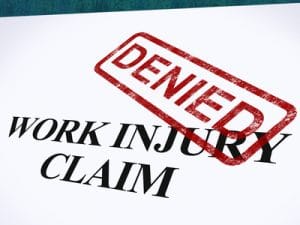People who develop carpal tunnel syndrome often have difficulty doing their jobs. Repetitive activity with their arms often causes them to have pain and numbness. Some people find it difficult to do fine motor activities with their hands and fingers.
Carpal tunnel can also affect your sleep. You may not get good sleep because you wake up at night and one or both of your arms feels numb.
 What causes carpal tunnel syndrome?
What causes carpal tunnel syndrome?
Before going any further, it is first very important to say that I am not a doctor. I am an attorney who represents injured workers in workers compensation claims.
Because I represent many people who get injured at work, I do see a lot of opinions from doctors about what causes a particular condition. Many doctors attribute the development of carpal tunnel syndrome to the performance of repetitive activities with your arms or hands at work. This article discusses a little bit more about what carpal tunnel syndrome is and the causes of it.
Unfortunately, a lot of people have jobs that require them to repeat the same activity with their arms or their hands. People whom make products or work on an assembly line often perform the same task over and over. Working with mechanical tool that repeatedly vibrate or jaw your arms can cause the same sort of problems.
In the workers compensation arena, we refer to conditions caused over time as opposed to one specific event as “cumulative trauma”. Carpal tunnel syndrome often fits in the cumulative trauma category if it develops as a result of doing the same or similar tasks over a period of time.
Does Georgia workers compensation law cover carpal tunnel syndrome?
If you develop carpal tunnel syndrome as a result of your job, can you get payment for medical treatment and lost wage benefits under Worker’s Compensation Law in Georgia? Yes, you can. Georgia workers compensation law provides coverage for physical cumulative trauma conditions that develop as a result of your work.
But, you will have to demonstrate that your work caused or aggravated your carpal tunnel syndrome to receive Georgia workers compensation benefits. Most often, you would demonstrate this by a medical opinion. If you saw a doctor off your employer’s panel of physicians after reporting a work injury, this doctor might give an opinion about whether your work activities caused your carpal tunnel syndrome.
The workers compensation insurance company has two choices after you report your case.
- They can accept your case and start paying benefits; or
- They can deny your case by filing a controvert.
What happens if the insurance company accepts my case?
If the insurance company agrees that your carpal tunnel syndrome is work related, they should accept your case and pay for the medical treatment you need. Georgia workers compensation has certain rules about what medical treatment the insurance company has to pay for. Be sure you understand those rules.
They should also pay you temporary total disability benefits if your injury causes you to miss work. If you end up with a permanent partial disability rating, the insurance company also should pay you some permanent partial disability benefits at some point.
Even if the insurance company accepts your case, you may face issues with getting benefits paid. The insurance company may argue that you do not need certain medical treatment that your doctor recommends. They may also fight about whether they have to continue paying you temporary total disability benefits.
What if the insurance company denies my case?
Just because Georgia workers compensation law covers carpal tunnel syndrome, it does not mean that the insurance company will automatically accept it in your case. Many times, insurance companies dispute whether carpal tunnel syndrome is work related.
The insurance company may claim that your carpal tunnel syndrome was not caused by the activity you did at your job. Sometimes, they argue that you did not work there long enough to develop carpal tunnel syndrome. Other times, they argue that your job was not that repetitive.
If the insurance company denies your claim, you need to consider requesting a hearing. First though, I would recommend talking to a Georgia workers compensation attorney so you can find out what your options are.
 What causes carpal tunnel syndrome?
What causes carpal tunnel syndrome?









